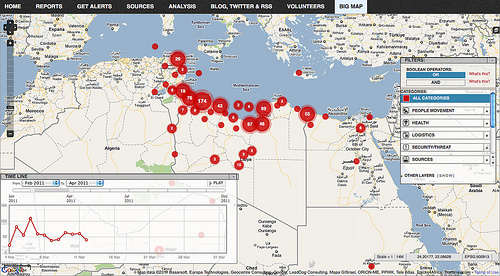
From mobile applications to improve the livelihoods of illiterate farmers to water-management and crisis mapping, the broad spectrum of research and projects presented at the ICT4D – The development impact of information and communication technologies conference on 10 November in Zurich was representative of the wide range of applications and impacts information and communication technologies (ICT) can have in the field of development. Organized by the ETH’s North-South Centre (which has repeatedly focused on the question of how ICT can best serve as a driver for development), the conference highlighted the need for a shift away from a technology-led approach towards one that emphasizes the creative use of already established technologies. Speakers included researchers and practitioners who were not only addressing classical development questions but also shedding light on the political dimensions of the use of ICT.
You’ll find a list of all speakers and their presentations at the end of this blog post. For now, let me pick out a few key themes and challenges that kept recurring throughout the discussion.
Local relevance
In many people’s minds, technology is detached from language. As an enabling tool, however, the role of language cannot be underestimated. Case in point: Iran’s post-election protests in 2009 have often been dubbed the first ‘Twitter Revolution’ –until people started wondering why Iranians would coordinate their protests in English rather than Farsi. Most analysts now agree that there was no Twitter Revolution inside Iran. ICT4D can of course deliberately be addressed to an international audience: to attract media attention for a certain issue or conflict, or to facilitate aid effectiveness and coordination, to mention just two examples.
If, on the other hand, ICT-facilitated projects are directly addressed to the local community, then local specifics such as languages or illiteracy have to be taken into consideration. These were among the challenges Hendrik Knoche and his team faced when they looked into ways farmers in India can find trustworthy information to help them adapt their farming practices. They found that speech-driven interfaces represent a promising tool to help illiterate or semi-illiterate users convey and submit information and data. Like many of the (research) projects presented at the conference, Knoche’s team used mobile phones to circumvent the lack of internet infrastructure in large rural parts of the developing world.
Do no harm
Do no harm, a guiding principle in any development or state-building context, seems all the more vital when information is potentially disseminated globally and within seconds. Once information has gone viral, the process can no longer be steered or managed centrally.
Take the presentation from France Lamy, Program Manager at Google.org (Google’s philanthropic arm) as an example. Google’s Map Maker lets you add and update maps that potentially reach hundreds of millions of users through applications like Google Maps (online and mobile) or Google Earth. Well aware that their mapping efforts not only empower the marginalized in conflict zones, but could potentially be politicized by any conflict party (governmental or others), the Google Map Maker team tries to stay out of sensitive decisions and focus on its role as a technological enabler. For guidance on political questions, it teams up with actors like the UN.
Following South Sudan’s historic referendum for self-determination in January 2011, for example, Google Map Maker collaborated with a number of actors to build a better map of the under-mapped region. Google first published updated satellite imagery and then co-hosted Community mapping events to map out what today is the world’s newest country. These events institutionalized parts of the verification process by putting together members of the Sudanese diaspora along with regional experts.
Ushahidi‘s Heather Leson openly admitted that verification mechanisms in the relatively new world of online crisis mapping are still a work in progress. Ushahidi is well aware of the potential political implications any of its community’s mapping efforts could have. It works together with a large pool of volunteers and members of academia, not only to create new maps for crisis and conflict situations, but also to constantly review and revise the mechanisms behind its mapping and information visualization platforms. This crowd-sourced approach brings together individuals from a variety of backgrounds and qualifications.
The bottom line of almost all of the presentations was that while ICT opens up entirely new ways of empowering otherwise marginalized actors, most of today’s applications are still in their infancy. An interdisciplinary approach which focuses on the need rather than the technology is the best way forward.
Speakers and presentations
- Jacques Bonjawo, Genesis Telecare: ICT technologies at the heart of sustainable development
- Gianluca Miscione, University of Twente: Global visibility and local accountability for water management in Tanzania
- Marc Blunier, Swiss Tropical & Public Health Institute: Access to knowledge and expertise through tele-medicine
- Lukas Ackermann, I-Lab, ETH Zurich and University of St.Gallen: Delivery of microinsurance by mobile phones
- Hendrik Knoche, EPF Lausanne: Voices in the field: Mobile phone applications to improve livelihoods of marginal and illiterate farmers
- Michael L. Best, Georgia Institute of Technology: ICTs and political developments in Africa
- Patrick Kalas, independent ICT4D Specialist: Voices 2.0 – The Arab awakening and practical lessons learned for development practitioners
- Isabella Rega, NewMinE Lab: Community multimedia centres in Mozambique: Providing information access to rural communities
Recommended reading
Crisis Mapping: A Phenomenon and Tool in Emergencies
In this recent CSS analysis, Myriam Dunn and Jennifer Giroux look at the emergence of crisis mapping as an example of how an increasing number of citizens now participate in crisis communication. To understand this trend, a more differentiated view of crisis mapping as a phenomenon and as a tool is needed to understand its benefits and limitations as well as its larger political and social effects in various settings.

